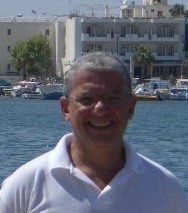Machine Learning Solutions for Future Wireless Communications
The Montreal Chapter of the IEEE Signal Processing Society cordially invites you to attend (either in presence or virtually) the following talk to be given at McGill University by Prof. Paulo Diniz, from the Department of Electronics and Computer Engineering, Federal University of Rio de Janeiro.
Date and Time
Location
Hosts
Registration
-
 Add Event to Calendar
Add Event to Calendar
Loading virtual attendance info...
- 3480 University Street
- Montreal, Quebec
- Canada H3A 0E9
- Building: McConnell
- Room Number: 603
- Click here for Map
- Contact Event Host
-
Prof. Benoit Champagne, ECE Department, McGill University, Montreal
Co-sponsored by STARaCom
Speakers
 Dr. Paolo DIniz of Federal University of Rio de Janeiro
Dr. Paolo DIniz of Federal University of Rio de Janeiro
Machine Learning Solutions for Future Wireless Communications
Abstract: Machine learning (ML) tools have been used in many applications. This presentation will discuss some investigation results by applying befitting ML techniques, where a few solutions are outlined and evaluated. The presentation includes the following topics:
-An ML-based solution for the mitigation of inter-symbol interference (ISI) and inter-block interference (IBI) caused by multi-path fading in orthogonal frequency-division multiplexing (OFDM) systems: The usual solution is employing a cyclic prefix (CP) with a length equal to the channel order. However, the channel order is not well known in some practical cases. Looking for a balance between a full-sized CP and its absence, we propose a reduced redundancy OFDM receiver using deep learning (DL). The solution brings about an improved reception performance compared with CP-free cases and a better spectrum utilization when compared with CP-OFDM cases. The architecture is also applied to zero padding (ZP) OFDM systems. The ML-based ZP-OFDM improves the performance, such as reduced bit-error-rate (BER), when redundancy is insufficient, and some form of nonlinearity is present at the transmitter end.
-Still being concerned with the practical case in which the channel order is not well known, a reinforcement learning algorithm can be applied to learn online the best CP length to meet a specific performance metric. Reinforcement Learning is a machine learning algorithm in which an AI agent learns from an environment by interacting with it. The agent acts on the environment and receives the feedback: the reward and the state of the environment. For instance, in estimating the channel in CP-OFDM systems, the agent is the transmitter. The action is related to the CP length. The environment comprises the channel and the receiver. The state is the MSE between the estimated channel and the actual channel, whereas the reward is related to the MSE.
-The last topic covers adversarial training for wireless communications to combat jamming in the multicarrier system, particularly OFDM. As ML solutions are known to be vulnerable to adversarial perturbations, it is essential to design robust systems to cope with them. The signal reception process is disrupted by malicious radio signals transmitted by the jammer/attacker. The goal is to design systems robust to jamming.
Biography:
Paolo Diniz: Dr. Paulo S. R. Diniz was born in Niterói, Brazil. He received his Electronics Eng. degree (Cum Laude) from the Federal University of Rio de Janeiro (UFRJ) in 1978, his M.Sc. degree from COPPE/UFRJ n 1981, and his Ph.D. from Concordia University, Montreal, P.Q., Canada, in 1984, all in electrical engineering. He wrote the books ADAPTIVE FILTERING: Algorithms Practical Implementation, Springer, Fifth Edition 2020, and DIGITAL SIGNAL PROCESSING: System Analysis and Design, Cambridge University Press, Cambridge, UK, Second Edition 2010 (with E. A. B. da Silva and S. L. Netto) and ONLINE LEARNING AND ADAPTIVE FILTERS, Cambridge University Press, Cambridge, UK, Second Edition 2022 (with M. L. R. de Campos, W. A. Martins, M. V. S. Lima and J. A. Apolinário Jr), and the monograph BLOCK TRANSCEIVERS: OFDM and Beyond, Morgan & Claypool, New York, NY, 2012 (W. A. Martins, and M. V. S. Lima). He is a Life Fellow of IEEE, and a Fellow of EURASIP. He also holds some best-paper awards from conferences and from an IEEE journal. In 2014, he received the Charles A. Desoer Technical Achievements Award from the IEEE Circuits and Systems Society. He is a member of the Brazilian Academy of Science (ABC) and of the National Academy of Engineering (ANE).
Email:
Address:Department of Electronics and Computer Engineering, Federal University of Rio de Janeiro, Rio de Janeiro, Brazil

